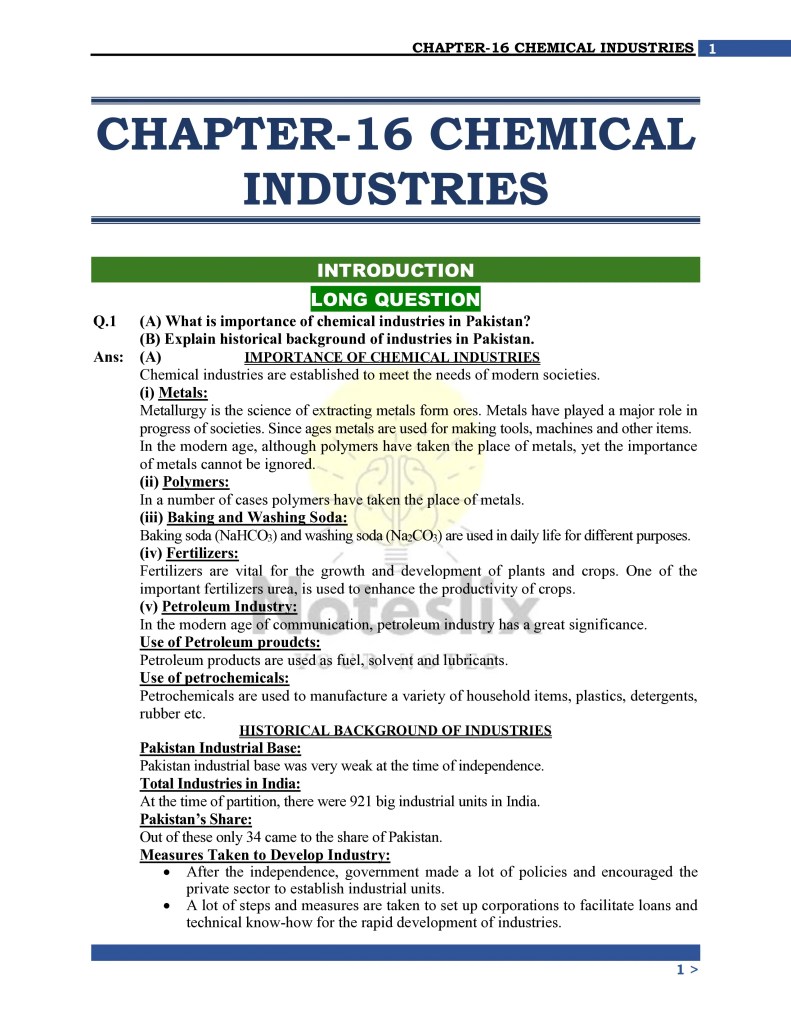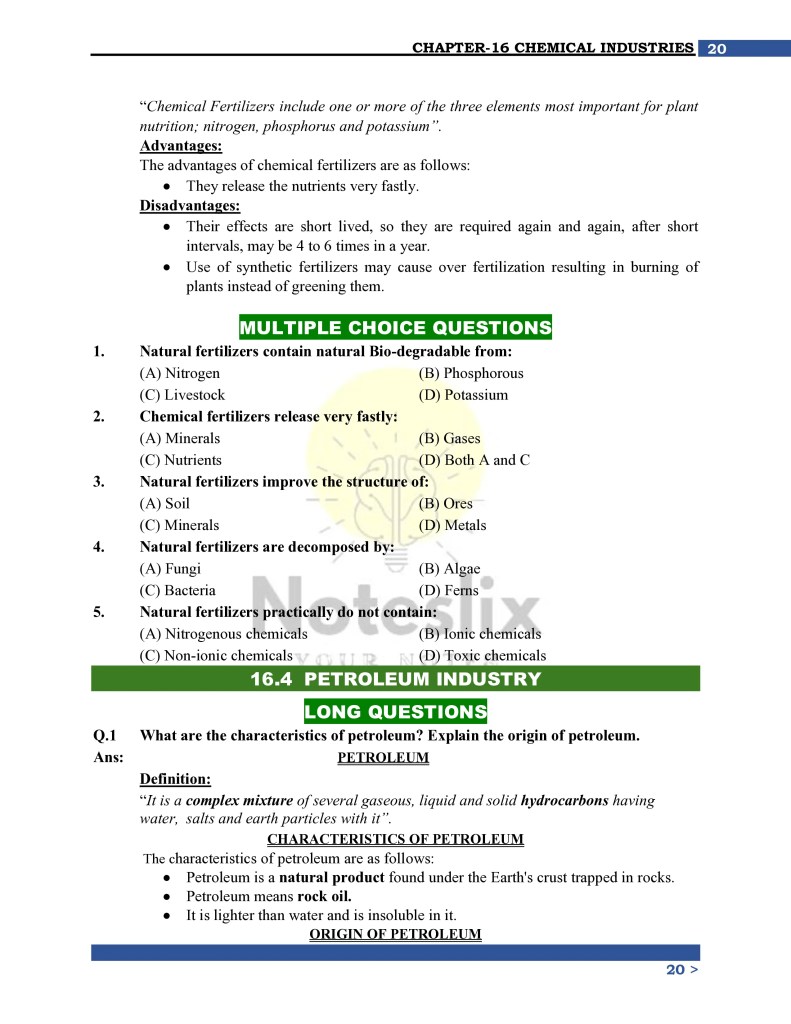Chapter 16, titled Chemical Industries, is one of the most essential topics in Class 10 Chemistry. This chapter provides a detailed understanding of the role and significance of chemical industries in Pakistan, their historical context, and the processes involved in producing vital chemical products like sodium carbonate and urea.
Understanding these concepts is not only crucial for academic success but also equips students with real-world knowledge of industrial chemistry applications. This guide compiles all the key notes, including MCQs, short questions, long questions, and numerical problems, for effective exam preparation.































Topics Covered in These Notes
These notes provide comprehensive coverage of the following topics from Chapter 16:
- Importance of chemical industries in Pakistan
- Historical background of industries
- Key chemical formulas (e.g., baking soda, washing soda)
- Definitions of minerals, ores, and gangue
- Metallurgical operations: concentration, extraction, and refining of metals
- Manufacturing processes for sodium carbonate (Solvay’s Process) and urea
- Role of technology in chemical production
- MCQs, short and long questions for each section
This extensive coverage ensures students grasp both theoretical and practical aspects of the chapter.
Chapter 16 Solved Notes Topic Wise
The notes for Chapter 16 include:
- MCQs
Multiple-choice questions test critical understanding and recall of key facts. Examples include:- Chemical formulas of essential compounds
- Definitions and principles, such as metallurgy and Solvay’s process
- Characteristics of petroleum and other industrial products
- Short Questions
These notes answer frequently asked questions like:- What is the chemical formula of washing soda?
- Define metallurgy and its steps.
- How is urea manufactured on an industrial scale?
- Long Questions
Detailed explanations of complex topics such as:- Industrial preparation of soda ash using the Solvay Process
- Metallurgical processes for extracting metals from ores
- Characteristics and refining of petroleum
- Numerical Problems
Solved examples demonstrate the calculation steps involved in industrial processes, helping students master quantitative aspects of chemistry.
These solved notes are a tool to reinforce understanding and excel in exams.
Tool for Success in Exams
This compilation is designed as an all-in-one guide for students. Here’s why it’s your ultimate tool for success:
- Comprehensive Content: Covers every topic thoroughly, including MCQs, short and long questions.
- Time-Saving: No need to sift through textbooks—concise, exam-focused notes are ready to use.
- Accuracy: Verified answers and solutions ensure reliable learning.
- Exam-Oriented: Prioritizes topics that frequently appear in board exams.
Colored Notes
One of the standout features of these notes is the use of color coding to enhance learning. Important definitions, formulas, and reactions are highlighted in different colors for better retention.
Key points such as the principles of Solvay’s process, metallurgical methods, and chemical reactions are organized in a visually appealing manner, making it easier for students to revise and recall during exams. This feature is particularly helpful for students who prefer a visual learning style.
Notes Are Free to Use
These notes are freely accessible for all students aiming to excel in their Class 10 Chemistry exams. By offering a cost-free solution, this resource ensures that every student, regardless of their financial background, can prepare effectively.
Sharing these notes among peers fosters collaborative learning and helps create a supportive educational environment.
Notes Are Mistake-Free
Meticulous care has been taken to ensure the accuracy of these notes. All the content has been reviewed and verified by subject matter experts, eliminating any errors in formulas, reactions, or explanations.
This mistake-free approach allows students to rely on the material with confidence, knowing that it aligns with the latest curriculum and exam patterns.
Benefits of Studying Chemical Industries
Studying Chapter 16 not only prepares students for their exams but also provides insights into real-world applications of chemistry. Key benefits include:
- Understanding Pakistan’s Industrial Landscape: Highlights the importance of chemical industries in the nation’s economic development.
- Learning Practical Applications: Explores how chemical processes are applied in industries like fertilizers, metals, and petroleum.
- Developing Problem-Solving Skills: Numerical problems and questions encourage analytical thinking.
Conclusion
These comprehensive notes for Chapter 16, Chemical Industries, are a reliable companion for Class 10 students preparing for their Chemistry exams. From detailed explanations of industrial processes to visually enhanced learning tools, they cover all aspects needed to ensure success.
The combination of free accessibility, mistake-free content, and practical relevance makes these notes an invaluable resource. Use them to boost your confidence, enhance your preparation, and achieve top marks in your exams.
Other Class 10th Chemistry Solved Notes Topic Wise
- Class 10th Chemistry Chapter 9 Solved Notes Topic Wise
- Class 10th Chemistry Chapter 10 Solved Notes Topic Wise
- Class 10th Chemistry Chapter 11 Solved Notes Topic Wise
- Class 10th Chemistry Chapter 12 Solved Notes Topic Wise
- Class 10th Chemistry Chapter 13 Solved Notes Topic Wise
- Class 10th Chemistry Chapter 14 Solved Notes Topic Wise
- Class 10th Chemistry Chapter 15 Solved Notes Topic Wise

